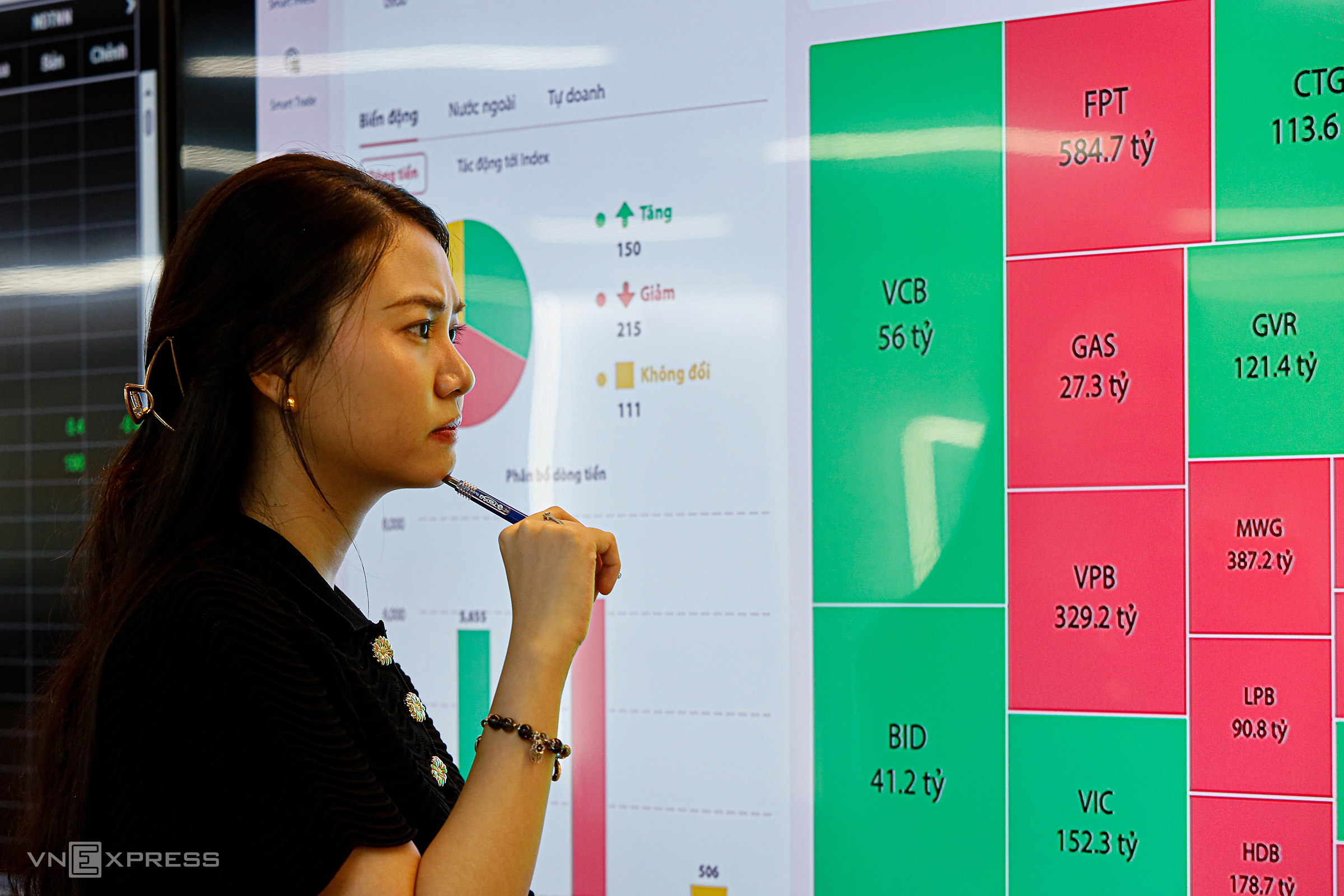The VN-Index closed June at 1,1376 points, up 110 points (8.6%) since the start of the year, its highest level since 4/2022. The first six months of the year saw a sharp market correction in early April following former US President Donald Trump's announcement of retaliatory tariffs. The market then rebounded strongly thanks to government actions to mitigate the impact of these tariffs.
However, this market volatility has led to uneven performance among equity mutual funds. Many funds, including some managed by reputable firms, continued to underperform through the end of June. According to data from fund trading platform Fmarket, 14 mutual funds recorded negative returns.
 |
Investors watch the market during a downturn in 10/2024. Photo: An Khuong |
VinaCapital's VDEF was the worst performer, down 5.49% over six months. NTP AM's NTPPF followed with a 4.66% decline. GFM's GFM-VIF ranked third-worst, dropping 3.44%. Other funds with negative returns included those from VinaCapital, IPAAM, Bao Viet Fund, SSIAM, Manulife IM, VCBF, and OUBAM.
Another 9 funds, while not in negative territory, still lagged behind the market’s average growth. This group included funds from SSIAM, VCBF, Dragon Capital, SGI Capital, and Mirae Asset.
On the other hand, only 4 equity mutual funds outperformed the VN-Index. Leading the pack were BMFF and MBVF, with returns of 11.15% and 9.67% respectively. Both are managed by MB Capital, targeting annual returns of 15-20% with a medium risk profile. BMFF currently manages 267 billion dong, while MBVF manages around 166 billion dong.
The remaining two outperformers were Dragon Capital's DCDS (8.89%) and Bao Viet Fund's BVFED (8.67%). Their performance tracked closely with the overall market.
Vo Nguyen Khoa Tuan, Senior Director of Equities at Dragon Capital, told VnExpress that many funds underperformed the VN-Index in the first half due to the poor performance of certain heavily weighted stocks in their portfolios.
Meanwhile, Vingroup stocks VIC and VHM, which account for about 6% and 5% of the VN-Index respectively, saw significant gains (135% for VIC and 91.8% for VHM), driving the index higher.
VnExpress's analysis of fund reports from the end of May confirms that underperforming funds mostly held stocks that declined or stagnated. 12 funds heavily invested in FPT, despite its nearly 22% drop. 15 funds held significant positions in MBB, even though MB Bank's stock only rose 2.8%. HPG, down almost 15%, was also a favorite among 10 underperforming funds.
The 4 outperforming funds, however, held stronger stocks. TCB was the top holding for BMFF and MBVF, and also featured prominently in DCDS and BVFED portfolios. Techcombank's stock rose about 38%.
Tuan attributed Dragon Capital's success to large holdings in well-performing stocks like TCB (up 38%) and STB (up 26%). The fund also made timely purchases of VIC and VHM at attractive prices, while strategically increasing its cash position before the market downturn, mitigating losses and enabling the acquisition of more stocks at discounted prices during the correction.
Regardless of performance, bank stocks remain the largest sector holding for most mutual funds, averaging over 31%. Nguyen Duy Anh, Portfolio Manager at Vietcombank Fund Management (VCBF), explained that equity funds benchmark their performance against various indices (VN-Index, VN100, VN30, VN70). Therefore, sector weightings in funds typically mirror those of their benchmark index.
Bank stocks consistently hold a significant weighting (25-40%) in most Vietnamese stock indices, from the VN70 to the VN-Index. Therefore, it's common for these stocks to feature prominently in fund portfolios. Furthermore, bank stocks generally have strong growth potential alongside the economy, being a primary source of capital. Banks are often among the first to benefit from economic growth. Currently, valuations for some banks remain relatively low, potentially driving future fund performance.
The stock market is currently approaching new highs for the year, maintaining a relatively stable long-term growth trend. As a result, mutual fund performance has improved since the April downturn.
When allocating capital to mutual funds, Tuan advises investors to take a long-term view (one year or more) to maximize returns, given the nature of this investment vehicle.
According to VCBF experts, this is an opportune time to accumulate assets and look beyond short-term market fluctuations. Vietnam has significant growth potential, and VCBF remains confident that the stock market will reach new heights.
"Investors should consider allocating a portion of their assets to stocks, perhaps through regular investments, to achieve their long-term financial goals," Duy Anh recommends.
Tat Dat












